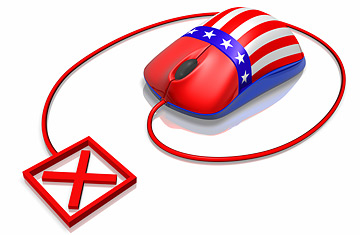
You are what you surf.
We've seen the political debates and watched the candidates haggle over the finer points of NAFTA support. As the presidential race heats up and barbs continue to fly across party lines, am I the only one that is feeling the effects of issue fatigue?
By now we have a plethora of comparison points on the political issues of the day. But as we look toward November with both parties eyeing potential swing voters, sides are beginning to blur. How can we tell the parties apart these days? Perhaps tribal signifiers won't rest on positions vis-a-vis Iraq or universal healthcare. Instead, our true colors might come out when we examine what we do on the Web. Do blue state Web surfers prefer visiting tennis sites while red staters prefer golf? There are ways to find out.
It's actually possible to understand the difference in online habits between Democrats and Republicans. We start with a survey of 35,000 Americans by Simmons Market Research Bureau, which tagged political affiliation along with other interests. The survey, along with other data, make up what's called a "mosaic," — segmentation of Americans grouped into 50 sections by similar behavior, interest and political affiliation. We can apply those segments to online activity to understand the difference between Democrats and Republicans.
First, to test the hypothesis, I checked the Democrat segments to see what kind of political sites they visit and the top sites included: Barackobama.com, smikrkingchimp.com and crooksandliars.com. Check. The same exercise on the other side of the aisle surfaced sites such as townhall.com and JohnMcCain.com. Satisfied that the system works, I probed deeper to see if I could tell different political affiliations based on what users do online — where they shop, how they play and their brand preferences. Some of the answers were intuitive, some counter.
In matters financial, both parties manage money through traditional channels, visiting high profile finance sites like Yahoo! Finance and the major online banks. Across all sites, Democrats are more likely to visit lottery sites (specifically those in Georgia and Maryland) than their conservative counterparts, while Republicans are more likely to visit their investment bankers online.
The difference between parties is clearest when we look at the online apparel stores visited by the two groups. Democratic segments reflect an urban bent in visits to Baby Phat, Dr. Jays and luxury brand Gucci, while the Republican segment's sites mirror an upscale suburban mall with Ann Taylor, Abercrombie for Kids and J Crew.
The most surprising finding was the religious sites visited by each group. Online data appears to challenge the concept of the religious right. When applied to the religious category, the Democrat types indicated high percentages for Christian Websites — specifically bible study sites — while red staters were most likely to visit Catholic sites, such as Catholic Answers, along with the expected skew towards family values focused sites.
Conducting this analysis across 172 different industry categories, it's clear that Americans who vote in tandem do lots of other similar things, too. Will this data help candidates looking for an edge? It certainly could help them target online advertising smartly. And it even could help them figure what to wear on the campaign trail and where best to kiss babies. In what might prove to be a tight race, any little bit can help.
